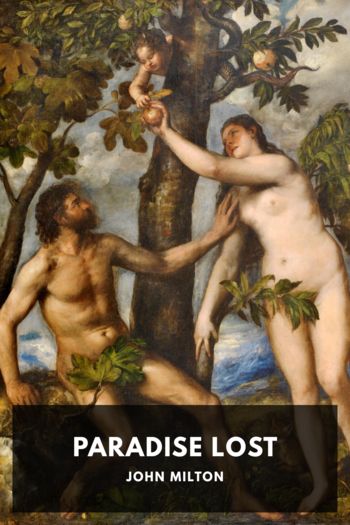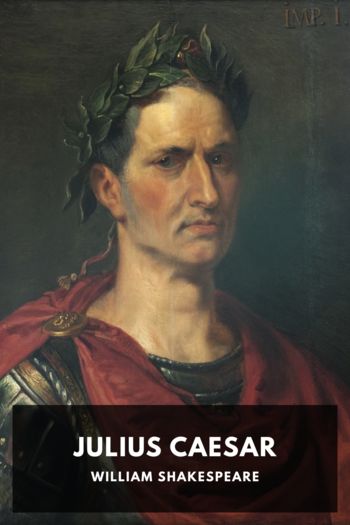The Wisdom of Father Brown by G. K. Chesterton (best english books to read .txt) 📕

- Author: G. K. Chesterton
Book online «The Wisdom of Father Brown by G. K. Chesterton (best english books to read .txt) 📕». Author G. K. Chesterton
More pines, more pathway slid past him, and then he stood rooted as by a blast of magic. It is vain to say that he felt as if he had got into a dream; but this time he felt quite certain that he had got into a book. For we human beings are used to inappropriate things; we are accustomed to the clatter of the incongruous; it is a tune to which we can go to sleep. If one appropriate thing happens, it wakes us up like the pang of a perfect chord. Something happened such as would have happened in such a place in a forgotten tale.
Over the black pine-wood came flying and flashing in the moon a naked sword—such a slender and sparkling rapier as may have fought many an unjust duel in that ancient park. It fell on the pathway far in front of him and lay there glistening like a large needle. He ran like a hare and bent to look at it. Seen at close quarters it had rather a showy look: the big red jewels in the hilt and guard were a little dubious. But there were other red drops upon the blade which were not dubious.
He looked round wildly in the direction from which the dazzling missile had come, and saw that at this point the sable façade of fir and pine was interrupted by a smaller road at right angles; which, when he turned it, brought him in full view of the long, lighted house, with a lake and fountains in front of it. Nevertheless, he did not look at this, having something more interesting to look at.
Above him, at the angle of the steep green bank of the terraced garden, was one of those small picturesque surprises common in the old landscape gardening; a kind of small round hill or dome of grass, like a giant molehill, ringed and crowned with three concentric fences of roses, and having a sundial in the highest point in the centre. Kidd could see the finger of the dial stand up dark against the sky like the dorsal fin of a shark and the vain moonlight clinging to that idle clock. But he saw something else clinging to it also, for one wild moment—the figure of a man.
Though he saw it there only for a moment, though it was outlandish and incredible in costume, being clad from neck to heel in tight crimson, with glints of gold, yet he knew in one flash of moonlight who it was. That white face flung up to heaven, clean-shaven and so unnaturally young, like Byron with a Roman nose, those black curls already grizzled—he had seen the thousand public portraits of Sir Claude Champion. The wild red figure reeled an instant against the sundial; the next it had rolled down the steep bank and lay at the American’s feet, faintly moving one arm. A gaudy, unnatural gold ornament on the arm suddenly reminded Kidd of Romeo and Juliet; of course the tight crimson suit was part of the play. But there was a long red stain down the bank from which the man had rolled—that was no part of the play. He had been run through the body.
Mr. Calhoun Kidd shouted and shouted again. Once more he seemed to hear phantasmal footsteps, and started to find another figure already near him. He knew the figure, and yet it terrified him. The dissipated youth who had called himself Dalroy had a horribly quiet way with him; if Boulnois failed to keep appointments that had been made, Dalroy had a sinister air of keeping appointments that hadn’t. The moonlight discoloured everything, against Dalroy’s red hair his wan face looked not so much white as pale green.
All this morbid impressionism must be Kidd’s excuse for having cried out, brutally and beyond all reason, “Did you do this, you devil?”
James Dalroy smiled his unpleasing smile; but before he could speak, the fallen figure made another movement of the arm, waving vaguely towards the place where the sword fell; then came a moan, and then it managed to speak.
“Boulnois … Boulnois, I say … Boulnois did it … jealous of me … he was jealous, he was, he was …”
Kidd bent his head down to hear more, and just managed to catch the words:
“Boulnois … with my own sword … he threw it …”
Again the failing hand waved towards the sword, and then fell rigid with a thud. In Kidd rose from its depth all that acrid humour that is the strange salt of the seriousness of his race.
“See here,” he said sharply and with command, “you must fetch a doctor. This man’s dead.”
“And a priest, too, I suppose,” said Dalroy in an undecipherable manner. “All these Champions are papists.”
The American knelt down by the body, felt the heart, propped up the head and used some last efforts at restoration; but before the other journalist reappeared, followed by a doctor and a priest, he was already prepared to assert they were too late.
“Were you too late also?” asked the doctor, a solid, prosperous-looking man, with conventional moustache and whiskers, but a lively eye, which darted over Kidd dubiously.
“In one sense,” drawled the representative of the Sun. “I was too late to save the man, but I guess I was in time to hear something of importance. I heard the dead man denounce his assassin.”
“And who was the assassin?” asked the doctor, drawing his eyebrows together.
“Boulnois,” said Calhoun Kidd, and whistled softly.
The doctor stared at him gloomily with a reddening brow; but he did not contradict. Then the priest, a shorter figure in the background, said mildly: “I understood that Mr. Boulnois was not coming to Pendragon Park this evening.”
“There again,” said the Yankee grimly, “I may be in a position to give the old country a fact or two. Yes, sir, John Boulnois was going to stay in all this evening; he fixed





Comments (0)